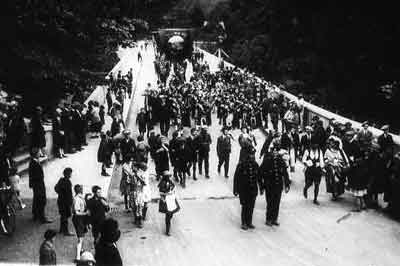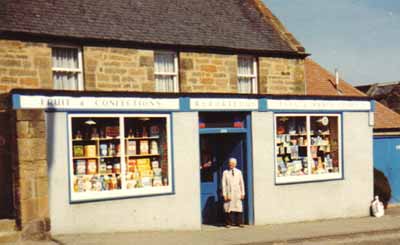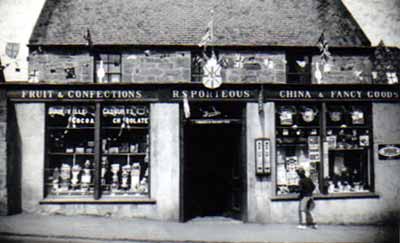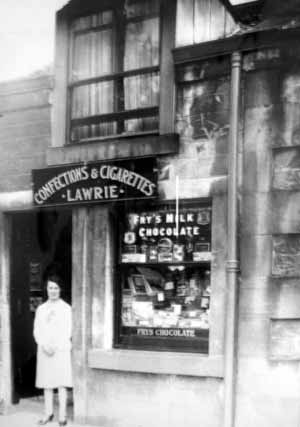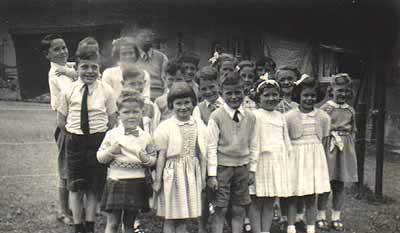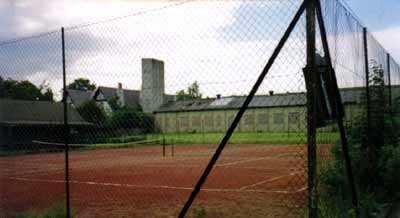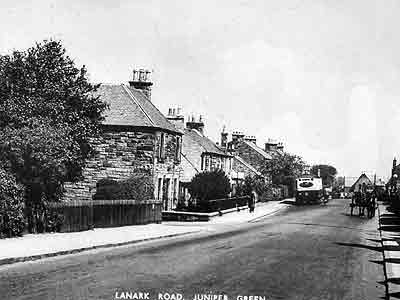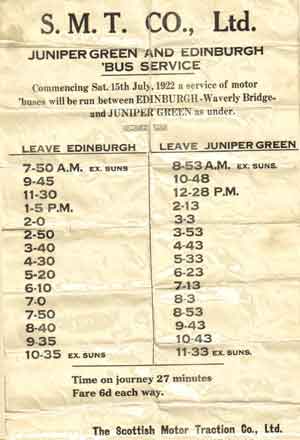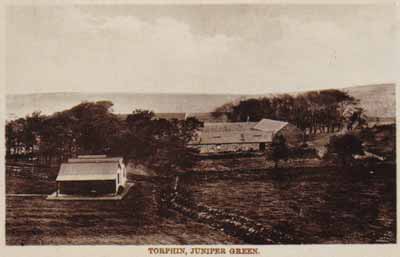Memories of Juniper Green
Annie and Betty remember...
The details in this article have been taken from an interview on Thursday 26th October 2006 with Lynda Anderson and Cliff Beevers. Jack and Gail Corse were also in attendance.
Gala days in the village
Annie: We used to have a pageant every year in the summer. Mr Bryce's drivers would decorate their lorries. Jessie, my sister-in-law, was on the back of a lorry with a sheep, she was dressed as Bo Peep. We lived up above the yard so we could watch the lorry drivers decorating their lorries They paraded from Juniper Avenue, Bryce's yard, up to Currie then back down through the village, down Baberton Avenue and then down Belmont Road and back to Mr Bryce's yard. Bryce's yard was where Juniper Place is today.
Other shops
Mr Bryce's aunt had a wee shop on Belmont Avenue (now Juniper Avenue). The boys from Merchiston Castle School would cycle up and they would sit outside and have tins of fruit and ice cream. It was on the same side as Bryce's yard. It was a busy wee shop, you could get milk there and sweeties too. There was waste ground around it surrounded by a wall.
Where the electrician is today that used to be Willie Dea's bicycle shop. Across the road next to the Kinleith pub you used to take your accumulators to get them charged up by Mrs More. The accumulator was like a battery for the radio. You would pay six pence to get your accumulator charged up. It was during the War and just after too.
There was a furniture shop behind the Kinleith because when Auntie Meg moved she had an extra bedroom and needed more furniture, a bed, a couple of chairs and a chest of drawers.
Annie: That's where I bought my bath for Jack.
There was a smiddy at the top of Belmont Avenue run by Mr Anderson. The kids used to like standing at the door while he was shoeing the horses so they could see all the sparks.
Annie: When Jack went to the Royal High he was supposed to wear short trousers until he was 16. But, we couldn't get short trousers to fit him. We did get them until he was 15. The man in the store at St Cuthbert's sent me a postcard when he got new stock in.
Bert Porteous' shop
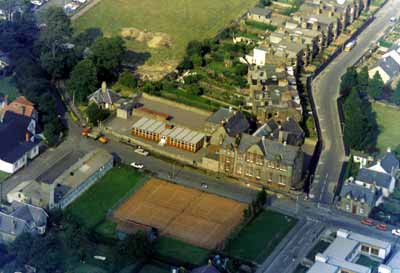
An aerial photograph of Juniper Green with the lodge house near the two-storey school on Baberton Avenue
Betty: When my aunt and uncle lived in Baberton Mains Farm I used to go there for the weekend. We would come up the side of the field and the golf course and you would come out by the school near a small house, a lodge house to Baberton House I think.
We would spend our shilling in Bert Porteous' shop. It was Bert's mother and father in it then. We would go for 2 pence of lemonade powder, penny chews and these big gobstoppers. They would last all day and you would take them out to see what colour they had changed to. You made your own lemonade with powder by adding water, stirring it up and there it was!
Annie: Bert used to make the most wonderful tablet.
Betty: He used to run a week Christmas club too. It was a way of saving up. You would put in a little every week and then when it came around to Christmas I would buy Christmas cards there and I remember buying a teddy there, a fireguard and different things like that.
Electricity
Annie: I remember Mr Noble going around lighting the gas lamps in the streets. Eventually, he became the beadle in St Andrew's Church. He lived in Woodhall Avenue.
We had gas in that house in Belmont Avenue, I don't know how many mantles I broke. We decided after a bit to get the electricity put in after the war when we had got some money together. Where we stayed it was a block of eight houses and because we were upstairs I asked the folk below if they wanted to convert too but they said that they couldn't afford it or they didn't want the bother. It was Harry Rankin who came to our house to put it in, there was an electricity shop where the Italian restaurant is today. It cost £10, we had to save up for that amount.
Betty: We never got electricity in East Mill and Lord Rosebery wouldn't sell to the old man ( Betty's father-in-law). The old man had wanted to buy it and then he would have the downstairs and we would have upstairs.
Coronation Day
Jack: I remember getting a mug for the 1953 Coronation which I still have.
Annie: We didn't have a television by then, we didn't even have electricity. My brother-in-law had bought a television and they stayed in a prefab down at Prestonpans. They were lucky, they had got a prefab and we all hiked away in the bus to see the Coronation.
The Lord Provost at Juniper Green
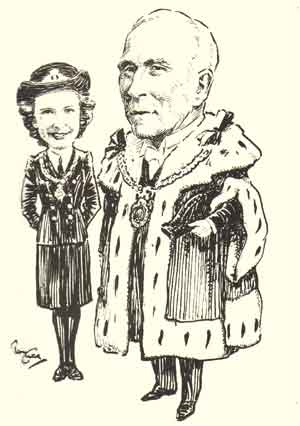
A drawing of Sir John Falconer and his daughter by Tom Curr, thanks are due to Tom's son Duncan Curr for permission to re-produce this drawing. Duncan is a long time resident of Juniper Green.
At St Andrew's we had the Lord Provost, Sir John Falconer. He was an Elder in St Andrew's and the provost and the council were kirked in the church. They were all in their red robes, it was a nice sight, the church was packed. His daughter was in the Wrens and she came out to be the Lady Provost as he was a widower.
In the cooking huts in the village
I used to cook in the village. We cooked for about 16 schools. There were three vans and we would put the food into containers. It was delivered to different schools. Then when they built Hailesland school they asked me to go there. That was lovely as I could see the school from my kitchen window at home. When I used to meet the children in the school playground they would say "When are we going to have pizzas again, Cookie, or when are we going to have steak pie?" There it was just a case of cooking small amounts, because the tables were laid for eight, we just cooked for eight.
To get to Hailesland we went through the fields, across the path by the golf course, it was a right of way through to Baberton Mains farm. The captain of the golf club objected to people using the right of way but he couldn't do anything about it.
The war
Annie: We heard the planes going over but we didn't have very much up here. There were anti-aircraft guns on the hills,
Betty: The german planes had a different sound to them. We lived in Motherwell at the time during a lot of the bombing. We were in our shelters for three days and nights at one time during the Clydebank raids. They were trying to hit the Singer sewing machine factory. It was a huge factory and it made army uniforms. If they could put it out of action then there wouldn't be uniforms. My father, he worked in the steel works at that time. Said it was time to bring my mother and me through to Kirknewton to my Gran's. Kirknewton was in the country and we would be safer there. Well the night we came through they tried to bomb the Forth bridges and they dropped a couple of bombs on Kirknewton and all the windows were shattered, this is him taking us to safety!
Bryce's lorries
Annie: Bryce's would have about 6 lorries. They would carry paper over from Woodhall mill to Inverkeithing. Woodhall was a boardmill. They would go around via Kincardine in those days ( before the Forth road bridge). Jimmy's granny ( my husband's granny) stayed in Inverkeithing. I was hanging out my clothes one day and Mr Bryce said he was going over to Inverkeithing, do you want to come? You can go to granny's house and I'll pick you up on the way back.
A peaceful double death
Annie: Well, we would always make a visit to my in-laws on Sundays and this particular Sunday I didn't feel too grand, I had paced the day in my dressing gown and Jimmy said are you coming then, you'll need to get dressed. So, I got dressed and we went up to see them. It was about 9 o'clock when we left them and the two of them stood at the telephone box on Juniper Avenue and they watched us go down Belmont Road. They were still waving as we reached halfway down the road and that was the last time we saw them. Jessie ( my sister-in-law) would phone every day and she didn't get any answers this day so she phoned me. . I said to her to phone the police and when I got there a policeman approached me. He took a pane out of the bedroom window and there they were lying in their bed, just as if they had fallen asleep. Dr Ross wondered if they had been killed with the gas and he got someone to check out the fire but there was nothing wrong with it. There wasn't much between their ages and they were both about eighty. It was such a shock. I think it was January/February 1976. It was a good way for them to go because we said "What will we do with the other one when one of them goes?"
Coming up the village brae!
Annie: When I was young I used to wonder why all the old folks looked into Bert Porteous' shop window. Now I know : it's for a wee rest having come up the brae.
I once saw this man at the top of Juniper Avenue and he was holding onto the dyke. I said to him what is the matter? And he said "I didn't know there was a brae there, but I do now!" and he was 94.
Characters
Annie and Betty: Dr Moir, he used to come up in his car, he always wore a bowler, Dr Moir. He was more interested in your pot plant than he was in you! Oh that's a nice plant - I havenae got that , I'll just have a wee bit!
He had his grave dug in Currie churchyard, and he went in to see if it was big enough... He was in it, tried it once or twice, ...it was all lined with brick.
He use to stop at Miss Martin's and go in and get his supplies of liquor, yea.
Dr Moir's sister in law, was Lady Auchterlonie. She stayed down the Hailes Brae, and after she was widowed , she used to cycle into town... you remember those "weeds"? And the black veil was flying... she could almost have flown!
Annie: I remember the old minister in Currie, Dr Stewart. I was visiting one time an old couple, the old man hadn't been very well and Dr Stewart came to visit him and he chatted away. Before he went away he took a half bottle of whisky out of his cape " That will maybe set you up" he says.
On the buses
There was the No. 14 went along Dundee Street and the 15 went Colinton, and the no.8 went straight into town, as simple as that. And you got to know all the characters.
The drivers would wait for you. And one time, Jack had a class on a Saturday morning, and the bus was sitting there, the conductor was standing outside. And he says "where is he then?" I said he was having his breakfast when I came out. And just then Jack came round the corner and the conductor says to the driver "Here he's coming, you can start up!"
Honest John Trotter, he was on the SMT bus and he sang all the journey! The snooty Kingsknowe people didn't like him because of his songs. He did 'one, two, three ma leary - next bus for you ma deary!' He got suspended'
In bad weather the bus drivers would come along and ask if you had any ashes as they couldn't get up Belmont Avenue as it ran uphill. They would throw the ashes under their wheels.
Betty: That was true at the Kingsknowe hill too. The buses would get stuck there every time it snowed. There was no such thing then as a gritter. If you were in town you had to walk back.
On the train
Annie: We went once with the mill trip. All the workers could go. They would have a day away each summer and we went once, from the station here at Juniper Green all the way to Largs. Don't ask me how we went but we got on the train here and landed up in Largs.
Betty: We would get the King and Queen at Ravelrig when I was out there. The royal train would pull in and they would stay there overnight. You would know when you saw the policemen and the soldiers walking up and down the line.
Sunday walks
Annie: We walked every Sunday after Jack came from the Sunday school. We would go across the hills and have a picnic. We sometimes landed at Habbies Howe if we were feeling well off and have our tea there. You would get a lovely tea there for 2 shillings and six pence: bacon, eggs, tomatoes a lovely tea for that price. Scones and cakes too. Once or twice we would meet Ned Barney, the swimmer from Portobello. He'd been my husband's teacher. He would be running over the hills doing his training with a heavy haversack on his back. He would run over to Habbes Howe and have a couple of pints.
The haugh was waterlogged
Annie: Kinleith Thistle used to play in Bloomiehall Park, they played in the park and it was all heaps and howes, it wasn't very level but the locals knew the pitch so they invariably won their home matches. They knew where the potholes were. They wanted to make a football pitch down on the haugh and it was waterlogged and now they want to build houses on it, ridiculous! They said it wasn't suitable for a football pitch so how can it be suitable for houses?
Bad weather : it was like living on an island!
Betty: When we lived in East Mill it was like living on an island sometimes. Two or three days of rain and you had the lade on one side and the Water of Leith on the other and both came up, it would stop at the gates. I recall lots of snow and having to dig myself out.
I remember having to dig the old man (her father-in-law) out at the back of the mill so he could get his coal. He kept cockerels and every time it saw me it made a dive for me. It would peck me. One Christmas the old man said "That's the end of you, now we'll peck you !"

